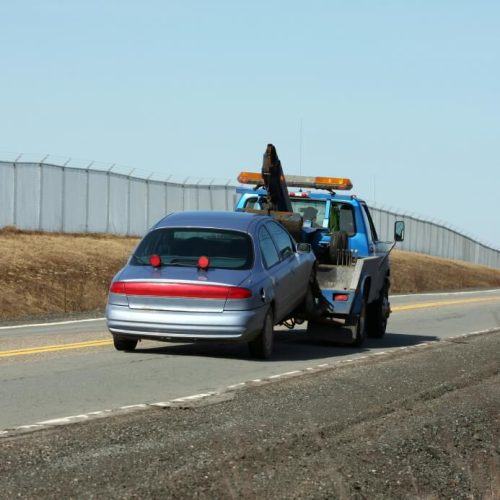
Your vehicle has just broken down and you’re stranded by the side of the road. If you’re one of the millions of Americans who belong to an automobile club like the American Automobile Association (AAA), or have auto insurance, you can always call for assistance.
But, whether you are or not, if a tow truck pops up out of the blue, don’t automatically think it’s your lucky day. The same goes following a car accident that has disabled your vehicle.
In fact, it could be you’re about to become the victim of what is known as a “bandit” tow truck scam.
What is a Bandit Tow Truck Scam?
A Bandit Tow Truck Scam refers to the deceptive practices carried out by unauthorized tow truck operators who prey on vulnerable and unsuspecting motorists. These unscrupulous individuals charge exorbitant prices for their services, often taking advantage of people in distress.
You may have no choice but to pay their fee under the threat of having your vehicle hauled away unless you fork over payment. This problem extends to private parking lots and other private property, where these operators take advantage of unsuspecting individuals.
It is essential to be aware of the potential storage fees, paperwork requirements, and additional costs that may be imposed by these unscrupulous businesses.
For example, they may insist on towing your vehicle to a specific location and charge exorbitant fees for storage. Being well-informed about your rights and the proper procedures can save you from falling victim to such scams. It is always a good idea to document the situation, including taking pictures and obtaining a police report, to protect yourself and provide evidence if needed.
Rising Threat: Bandit Tow Truck Scams in Los Angeles
The problem of bandit tow truck scams has become so prevalent that the Los Angeles Police Department (LAPD) and the National Insurance Crime Bureau (NICB) teamed up in 2014 with a joint directive to warn drivers about this serious issue in certain communities in and around Los Angeles.
Bandit Tow Trucks and Exorbitant Towing Charges
According to the NCIB and LAPD press release, “Towing charges, which should amount to a few hundred dollars, often skyrocket to a few thousand dollars once the bandit tow truck operator hauls the vehicle away from the accident scene.”
Identifying Other Red Flags
In addition, NICB Special Agent Doreen Sanchez says, “The drivers may say they will take the vehicle to a location of the owner’s choice, but they then take it to an undisclosed body shop that is paying them a kickback.
Under California law it is illegal for a tow truck operator to respond to an accident scene without being requested. (Section 22513 (b) California Vehicle Code). Both agencies advise motorists to never allow an unknown tow truck operator to tow your vehicle. “If you did not request it, reject it!”
You should also be leery of a tow truck appearing out of nowhere after your vehicle becomes disabled. If you’ve already called for help, send them away until the tow truck service you requested arrives.
How Bandit Tow Truck Scams Work?
- Stalking Accident Scenes: Bandit tow truck operators monitor accident scenes using police scanners to identify vulnerable motorists in distress. They quickly arrive at the location, offering immediate assistance. However, once hired, they exploit the situation by inflating towing fees and piling on exorbitant repair charges. Victims are often coerced into paying these inflated costs under the threat of having their vehicles impounded.
- Working with Unscrupulous Auto Repair Shops: In collusion with unscrupulous auto repair shops, bandit tow truck operators tow vehicles to specific locations, often undisclosed to the owner. These repair shops pay kickbacks to the tow truck operators for bringing in business. The repair shops then overcharge for repairs and services, compounding the financial burden on unsuspecting car owners.
- Insurance Fraud: Bandit tow truck scams also involve insurance fraud. Dishonest operators may submit false or exaggerated claims to insurance companies, seeking excessive reimbursement for towing services and storage fees. This fraudulent practice burdens both the insurance industry and policyholders, leading to increased premiums for all.
Tips to Avoid “Bandit” Tow Truck Scams
Below are some helpful tips from the NCIB to keep you from becoming the next victim of a “bandit” tow truck operator.
- If you have roadside assistance through an automobile club or your auto insurance company, call their toll-free number for help. Do not accept help from an unrequested tow operator.
- If you’re involved in a car accident and your car breaks down, contact police and your auto insurance company and have them request an authorized tow truck company so you know where your vehicle will be taken.
- If you’re unsure about whether the tow truck is legitimate, call back to the roadside service center to confirm the identity of the tow company dispatched. And, check the name on the truck to be sure it matches.
- If you’re asked to fill out a towing release form, don’t sign it unless it clearly spells out the exact location where you want your vehicle taken and all charges involved.
- If you’re still uncomfortable about the tow, take pictures of the truck to include the towing company name.
- If you suspect fraud, or if the bandit tow truck driver won’t leave after you request him to do so, call the police immediately.
Reliable Roadside Service: Consult Your Agent
While most tow truck drivers are honest, there are some who aim to deceive. Safeguard yourself against insurance fraud and unexpected bills. Consult your agent to add reliable roadside service to your policy. Don’t wait for emergencies; secure your peace of mind.
Contact Freeway Insurance for trusted coverage and support. Get a fast and free quote online, give us a call at (800) 777-5620, or stop by one of our convenient locations.



